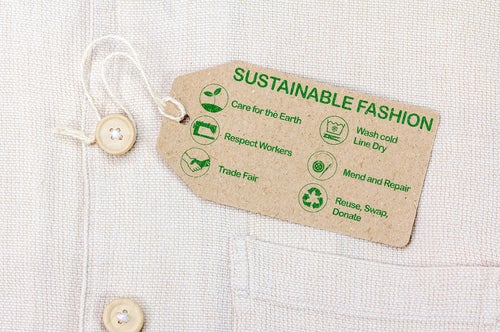
According to a study carried out by international law firm RPC, five of 21 allegations of greenwashing made to the Competition and Markets Authority (CMA) since the Green Claims Code was introduced in September 2021 related to the fashion industry.
The Code aims to stop businesses from making inaccurate or misleading claims about their (or their products’) environmental credentials.
Complaints made about fashion brands may relate to, for example, false or misleading claims about the use of recycled materials in a clothing line, claims that the clothing is manufactured in a “sustainable” way or that buying the product will be beneficial to the environment.
In April the government confirmed its plan to give the CMA greater powers to impose sanctions on businesses found to breach consumer protection laws, including the ability to fine businesses as much as 10% of their annual global turnover. Earlier, the government was urged to introduce standard legal definitions for sustainability in a bid to clampdown on greenwashing
Ciara Cullen, a Partner in RPC’s retail and consumer group, says: “Complaints to regulators about ‘greenwashing’ are likely to increase over the coming years in light of increasing regulatory scrutiny of green claims.
“We’re also seeing regulators, such as the CMA and ASA, proactively investigating specific industries – this includes the fashion sector with the CMA recently announcing its plan to ‘name and shame’ the worst greenwashing offenders amongst fast fashion brands.

US Tariffs are shifting - will you react or anticipate?
Don’t let policy changes catch you off guard. Stay proactive with real-time data and expert analysis.
By GlobalData“With the CMA being granted additional enforcement powers, this will significantly increase the risk for businesses who get environmental claims wrong. Given the potential scope of penalties, it would be prudent for businesses to ensure that any green claims can be appropriately substantiated at the time they are made.
“With the US-style class actions becoming more prevalent in the UK and Europe, businesses will not only have to contend with greater regulatory scrutiny but could also find themselves having to ultimately pay out significant sums to disgruntled customers.”
RPC says in order to avoid greenwashing, businesses should comply with the principles in the Green Claims Code and ensure:
- Claims are truthful and accurate
- Claims are clear and unambiguous
- Claims should not omit or hide important relevant information
- Comparisons should be fair and meaningful
- Claims must relate to the full life cycle of the product or service
- Businesses can substantiate their claims
Earlier this month the EU Council and European Parliament reached a provisional political agreement on the corporate sustainability reporting directive (CSRD), aimed at reducing greenwashing.
The proposal aims to address shortcomings in the existing rules on disclosure of non-financial information, such as sustainability issues, environmental rights, social rights, human rights and governance, which the Council says was of insufficient quality to allow it to be properly taken into account by investors. Such shortcomings hinder the transition to a sustainable economy, says the Council.



